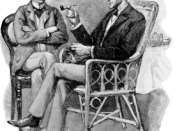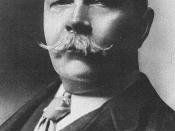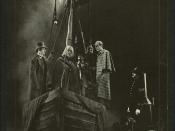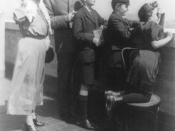Callum Mclarty 11JR 4/3/2008
What are the main pleasures for the reader when reading Sherlock Holmes Stories?
Arthur Conan-Doyle has created one of the most famous characters in the world, and invented an entire stereotype. He has done this by creating stories with compelling locations, engaging characters and complicated plots with many twists, turns and red herrings. His stories give the reader lots of pleasure in many different ways, and these will be explored and analyzed in turn.
Some of the enjoyment from a Sherlock Holmes story comes from the genre, crime fiction. At the time of Conan-Doyle's writing's the new and exciting genre of crime fiction was just blossoming. Another notable example of crime fiction from this time is Agatha Christie's Poirot Like most of the literature of the time, it was full of formulaic plots and stereotypical characters. People were attracted to the "apparently" formulaic simplicity of crime fiction, while the twists and turns of the plot often confused and disorientated the most diligent reader.
Much of the crime fiction that may have inspired Conan-Doyle were based in context. In the Victorian times there were much higher levels of crime and the police force was a lot more incompetent than now. This may not be solely down to lack of skill, but also to the lack of modern day technology available The public were in need of a hero to solve any crime, and Conan-Doyle filled the niche. A modern example of this is the fictional superhero Batman.
Another reason for the attractiveness of crime fiction is the voyeuristic pleasure derived from reading about people carrying out criminal acts. By suppressing their "Id" and acting instinctively, people can ignore the rules that society sets down on how we must act and behave, this is very interesting to read and may explain why crime fiction is still a very popular genre today.
Nowadays crime fiction has become more varied and more interesting. Now, it often branches out into suspense, thriller and romance fiction. This has become necessary because people now require more stimuli and have shorter attention spans. Some examples of this are the wildly successful Dan Brown stories, Brown intertwines complicated crime plots with action and romance in a way which is much more extreme than the Sherlock Holmes Story, but not too far removed from.
One of the main ways Conan-Doyle created pleasure for the reader is through the relationships between the characters, especially through the unusually close relationship between the two main characters of Holmes and Watson. In the wider context of the 19th century, homosexuality was illegal and men were expected to be stereotypically "strong and silent" and a "lone wolf". Conan-Doyle make a point of introducing characters which are very different from the stereotypes of the time, an example of this is Irene Adler in a Scandal in Bohemia. She is (seemingly) smarter than even Holmes and succeeds in outsmarting him, by introducing a character that can outsmart the 'hero', and especially by making her a woman Conan-Doyle has bucked the trend. The character of Irene Adler is further explored later on.
Another way in which Conan-Doyle gives pleasure to the reader is through the context of class. Holmes and Watson are both upper class London gentlemen and they typically provide their services to the upper class. By showing that upper class life has just as many problems and issues as the other classes, Conan-Doyle reassures the reader and makes the reader feel better about his own life (Since most people reading the stories would have been in the middle and lower classes). In comparison to the modern day, Conan-Doyle's stories could be compared to The OC, a modern day drama about the lives of the super-rich, living in California's infamous Orange County. The show was immensely popular, as it offered a voyeuristic look at the lives of the money-obsessed, Unfaithful, and "waspy" people who live there and the scandals that embroil the characters. However, this voyeuristic appeal can be applied to the majority of soaps and dramas on TV today.
Another way in which Conan-Doyle creates pleasure for the reader is through Holmes's stream of consciousness, or rather lack of it. Conan-Doyle is very careful not to reveal, at first, Holmes's thought process, but our experience of Holmes tells the reader that Holmes is analyzing every minute clue and slowly forming the picture up in his head. His deductions will unerringly turn out to be correct down to the last minute detail. If the stories were autobiographical and it was Holmes narrating the story in a style similar to Holden in a Catcher in the Rye, then the reader would know everything at the same time as Holmes, and the story would loose much of the suspense and surprise. By having Watson writing it down and by not revealing Holmes 's half-formed theories, Conan-Doyle creates a mystery within a mystery, as the reader tries not only to guess who did it and how, but to also attempt to guess who Holmes suspects.
Another way with which Conan-Doyle Gives pleasure to the reader is through the interactions between the characters. This can range from the interrogations of Holmes's suspects to the sarcastic mockery of the king in Scandal in Bohemia. Since Holmes is almost always vastly more intelligent than the people he is talking to, this provides entertainment to the reader as he plays and toys with them throughout the conversation. Connected to this is Holmes's interaction with Watson. It has already been said the two have an unusually close relationship in context, but Conan-Doyle uses the Interaction between the two as a device to really explore the relationship. In some stories, he can be quite dismissive of Watson, since Watson, by playing the role of surrogate audience, has to say the obvious thing, which is usually wrong, which appears to perturb Holmes to some degree. However in Scandal in Bohemia, when Watson rises to leave, Holmes motions for him to stay, showing that he really does value Watson after all.
"I think I had better go, Holmes."
"Not a bit doctor. Stay where you are. I am lost without my Boswell."
One other way with which Holmes gives pleasure to the reader is through the characters and their context in the time of the writing. Conan-Doyle is exceptional for his time, by addressing issues such as gender representation and the male/female stereotypes that were so prevalent at the time of writing in the late 19th century. At that time, women were viewed as a lesser class than their male counterparts, strong independent women were rare. These two quotes back up this point,
"I wish she had been of my own station, what a queen she would have made." - The King of Bohemia
"From what I have seen of the lady, she seems to be on a very different level to your majesty" - Sherlock Holmes
(This quote shows an example of both Holmes's respect for Adler, and also his intelligent mockery of the King, whom he apparently finds quite stupid)
It has been suggested by some that Conan-Doyle created the duo of Watson and Holmes as a reflection of his own personality. Watson is the careful, upper-middle class, family man, while Holmes is the rich, slobby, Bohemian "outcast" (as despite his fame as a detective, he seems to shun society, and does not appear to have any friends beyond Watson). The pair appears to balance each over out in a sort of "Ying-Yang" which may represent the two "sides" of Conan-Doyle's personality.
Personally, I am attracted to the stories because of Conan-Doyle's distinctive style of writing. He typically uses very descriptive writing, which adds to the stories in many different ways. One way he adds to the stories is by giving clues to the reader, they are often very subtle, the reader would realize the clues are in there without seeing it fully themselves, and would re-read the passage in an attempt to find the hidden clue; this creates an interesting and engaging story for the reader.
An example of this is in a Silver Blaze, where Holmes has noticed a clue in a sheep paddock, but it is not at first obvious to the reader;
"You have a few sheep in the paddock," he said. "Who attends them?"
"I do, sir"
"Have you noticed anything amiss with them of late?"
"Well, sir, not of much account. But three of them have gone lame, sir."
I could see that Holmes was extremely pleased, for he chuckled and rubbed his hands together."
It is obvious to the reader that Holmes has found something interesting in this interaction; however it is defiantly not obvious at first what it is, this enigma greatly adds to the story.
The above mentioned characteristic of a Holmes story is related to this next point. Conan-Doyle is very fond of using red herrings in his stories, laying a false clue or false character in order to confuse the reader into thinking a certain character may be a villain, or to confuse the plot. These add an entirely new dimension to the crime fiction genre, as the reader now has to look out for possible red herrings at the same time as attempting to work out the plot.
Conan-Doyle uses a variety of techniques and devices to create pleasure for the reader and to make the stories more interesting and engaging to the reader. Using a variety of these techniques and devices in each story, he has successfully created a large number of book's all of which are completely different, with different characters and plot twists.
Sherlock Holmes Coursework





